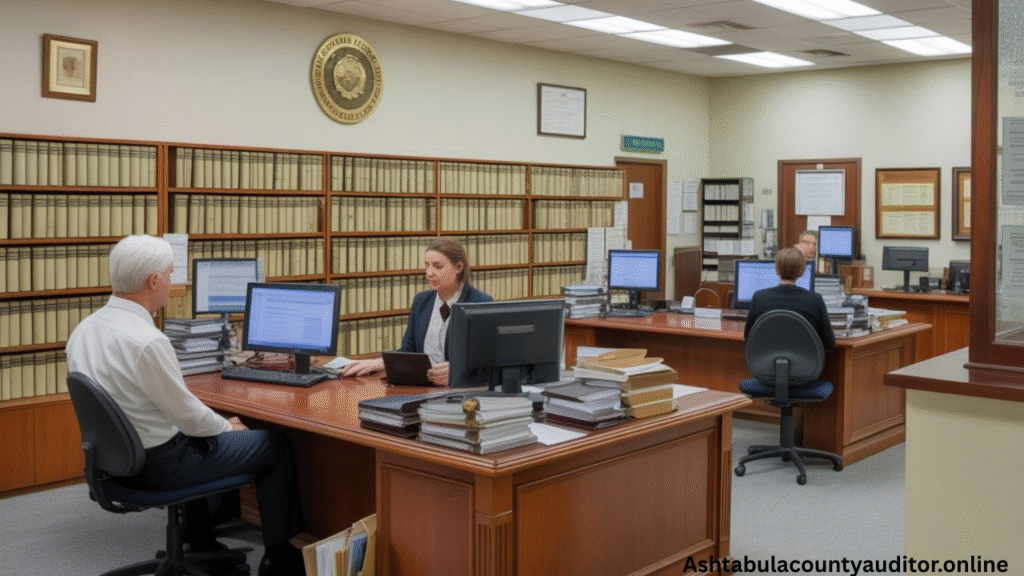Imagine you need to get a legal document or view your court case record, but you have no idea where to go or how to request it. This confusion is common among citizens trying to navigate the court process. The Ashtabula County Clerk of Courts – Legal Division serves as the gateway that eliminates this confusion. This office not only maintains all legal documents but also manages the service of process, makes records publicly accessible, and assists citizens in obtaining case filings, proofs, and updates. If you’ve ever wondered what the Clerk of Courts does, how the Legal Division operates, what kinds of records are available here, and how you can access your documents this article is for you. Let’s explore in detail how this division ensures transparency, organization, and accessibility within Ashtabula County’s judicial system.

Ashtabula County Clerk of Courts – Legal Division Overview
The Ashtabula County Clerk of Courts – Legal Division is the central administrative hub for all court filings, judicial records, and legal documentation in Ashtabula County. This office acts as the official custodian of court records and ensures transparency and accessibility in the legal system. It handles pleadings, motions, judgments, and court orders receiving, indexing, storing, and distributing them efficiently.
The Legal Division plays a crucial role in maintaining the accuracy of court information so that litigants, attorneys, and citizens can easily access verified documents. Additionally, it collects fines, fees, and other court-related costs, ensuring proper distribution to local government agencies.
Role of the Clerk of Courts
The Clerk of Courts serves as the record keeper of the county’s judicial system. Every case file, judgment, and motion is securely stored in this office. The Clerk accepts new filings, maintains court dockets, manages calendars, and supports attorneys and judges with administrative assistance.
Beyond documentation, the Clerk’s office also processes payments collecting court fees, fines, and costs and provides public access to certified copies of documents and transcripts. Essentially, it ensures the smooth functioning of the court system and preserves legal transparency for all.
Functions of the Legal Division
The Legal Division manages the county’s civil, criminal, and traffic cases. It processes service-of-process instructions, verifies legal service compliance, and provides certified payment and record services.
This division also handles legal filings, court cost deposits, protective orders, lien releases, and searches for public records. In short, the Legal Division ensures every step in the judicial documentation process meets legal standards and is properly recorded.
Visit: ashtabulacountyclerk.us

Types of Records Available
The Ashtabula County Clerk of Courts – Legal Division provides access to multiple record types, including:
- Civil case files (complaints, responses, motions)
- Criminal case documents (indictments, sentencing, judgments)
- Traffic violation and citation records
- Court orders, decrees, and judgments
- Vehicle and watercraft title records (Title Division)
- Naturalization and other historical legal records
All these are part of the public record, accessible through in-person visits or the online case portal.
Service of Process
The Service of Process is a legal method of delivering court documents such as summonses, subpoenas, and complaints to the involved parties. This ensures that everyone affected by a court action is formally notified.
The Ashtabula County Clerk of Courts – Legal Division manages this process, verifying that each service is completed according to legal requirements. If service is not properly executed, court actions may be delayed or invalidated.
Service of process requests can be made through the office using the appropriate precipes and forms.
Certified Mail
Certified Mail provides proof that legal documents were sent and received. The recipient must sign upon delivery, and tracking records serve as evidence. This method is commonly used when personal service isn’t feasible or permitted.
Unclaimed Certified Mail Service
If certified mail is returned as “unclaimed,” the Legal Division logs the return and determines the next steps. Depending on the court’s order, the service may be reissued using personal, residence, or publication methods.
Ordinary Mail
Ordinary Mail may be used when allowed by court rules. While less reliable due to limited proof of receipt, it can be legally valid in some cases if proper documentation of mailing is maintained.
Personal Service
Personal service means directly handing the legal documents to the defendant or party involved. This is the most reliable form of service because the delivery date, time, and recipient are verifiable.
Residence Service
Residence Service, or substitute service, is used when the defendant is not available at home. In such cases, documents are handed to an adult family member or resident. The law defines who qualifies as an acceptable substitute.
Service by Publication
When the involved party cannot be located, the court may order service by publication posting a legal notice in an approved newspaper for a specified duration. The Legal Division ensures the notice is published correctly and within the required timeframe.
Definitions of Good Service
“Good Service” refers to any legally valid method of serving documents that meets due process requirements. To be accepted by the court, proof must include the service method, date, recipient, and evidence such as signatures or return receipts.
- Ordinary Mail: Valid only if the law allows and proof is maintained.
- Certified Mail: Strong proof due to the recipient’s signature.
- Personal Service: The most reliable form, with direct delivery.
- Residence Service: Valid when delivered to an eligible adult resident.
- Publication: Acceptable only when ordered by the court and properly executed.
Accessing Case Records
The Ashtabula County Clerk of Courts – Legal Division provides multiple options for accessing case records:
- Online Access: Use the official eAccess portal to search cases digitally at courts.co.ashtabula.oh.us
- In-Person Requests: Visit the Legal Division office to view or copy case files.
- Mail Requests: Submit a written request with names, case number, and payment details.
Typical fees include $0.25 per page, $1 for certified copies, and $6 for exemplified copies.
Some records like juvenile or sealed cases may have restricted access.
Contact Information & Office Hours
Address:
Ashtabula County Clerk of Courts – Legal Division
25 W. Jefferson Street, Jefferson, OH 44047
Phone: (440) 576-3637
Fax: (440) 576-2819
Website: ashtabulacountyclerk.us
Title Division Office:
2 West Walnut Street, Jefferson, OH 44047
Phone: (440) 576-3640
Fax: (440) 576-2359
Certified Payments: (440) 576-3238
Office Hours:
Monday to Friday, 8:00 AM – 4:30 PM
If the office is closed during holidays or maintenance periods, you can still access online services or use mail-in request options.
Office Closed
When the office is temporarily closed due to holidays or maintenance, citizens can use the online portals or submit requests through mail or drop-box services. The website regularly updates office closure notices and alternative service instructions.

Conclusion
The Ashtabula County Clerk of Courts – Legal Division is a vital institution that maintains court records, manages service of process, and provides the public with access to essential legal documents. Its role ensures the judicial process remains transparent, accurate, and efficient.
Through methods such as certified mail, personal service, residence service, and publication, the Legal Division upholds lawful notification standards.
By offering both online and in-person access to court files, this office stands as a bridge between the public and the justice system ensuring every citizen can reach the records and information they need with confidence and ease.
FAQs –
1. What is the role of the Ashtabula County Clerk of Courts – Legal Division?
The Ashtabula County Clerk of Courts – Legal Division manages all legal filings, maintains official court records, and provides public access to documents. It handles civil, criminal, and traffic cases while ensuring the accuracy and transparency of the county’s judicial system.
2. What types of records can I find at the Legal Division?
You can access civil, criminal, and traffic case records, as well as court orders, judgments, and decrees. The office also maintains vehicle and watercraft title records through its Title Division and holds historical and naturalization records.
3. How can I access my case or court records?
Records are accessible online through the official eAccess portal, in person by visiting the Clerk’s office, or by mail request with the case details and payment. Certified copies and exemplified documents are available upon request.
4. What is the purpose of the Service of Process?
Service of Process ensures that individuals involved in a legal matter are formally notified about court proceedings. The Legal Division oversees this process using methods like certified mail, personal service, or publication.
5. Which service methods are accepted as valid by the court?
The main service methods include Certified Mail, Ordinary Mail, Personal Service, Residence Service, and Service by Publication. The Ashtabula County Clerk of Courts – Legal Division ensures that all methods follow legal requirements.
6. What does “Good Service” mean in court procedures?
“Good Service” means that documents were served in full compliance with the law, including correct method, date, and recipient verification. Courts only proceed when good service is proven.
7. How can I get certified or official copies of documents?
Certified or exemplified copies can be requested in person or by mail. Typical costs are $1 per certified copy and $6 for exemplified copies. Forms and payment instructions are available on the official website: ashtabulacountyclerk.us.
8. Can I access records if I can’t visit the office?
Yes. Most records are available online through the court’s Access portal. You can also mail in a written request with case details and payment to receive documents by post.
9. Where is the Ashtabula County Clerk of Courts – Legal Division located?
The office is located at 25 W. Jefferson Street, Jefferson, OH 44047.
Phone: (440) 576-3637
Website: ashtabulacountyclerk.us
10. What are the office hours and what happens when the office is closed?
The office operates Monday through Friday, 8:00 AM – 4:30 PM.
If closed for holidays or maintenance, citizens can use online services or mail requests. Closure updates are posted on the official website.

